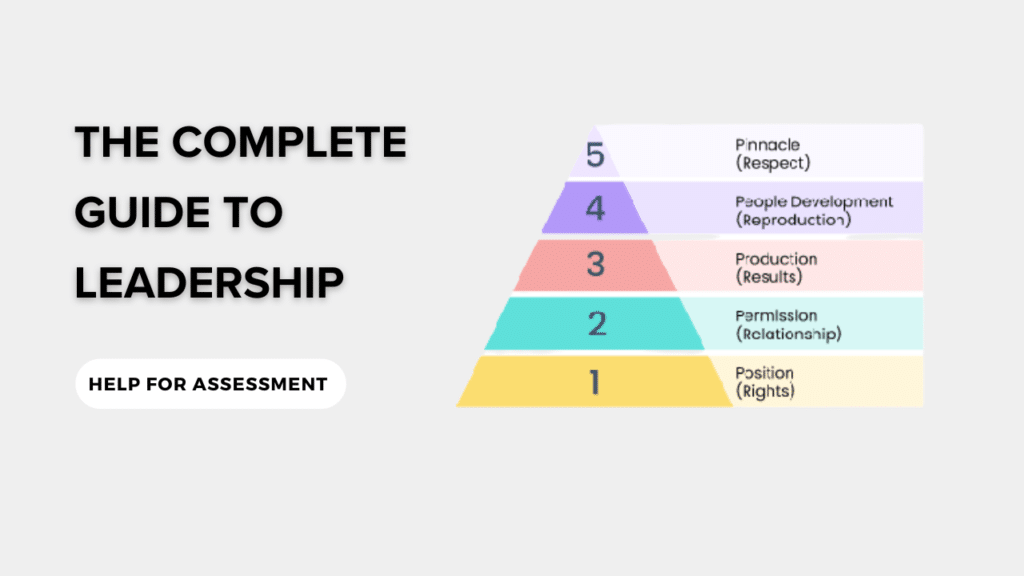The 5 levels of leadership is a phenomenon concept developed by John C. Maxwell, a leadership expert and a New York Times bestselling author and coach.
By learning, understanding, and grasping these levels of leadership, you’ll have an easy time to influence and deal with people, as well as level up your leadership skills.
This article looks at three things:
- The 5 levels of leadership by John C. Maxwell
- The benefits of each level
Let’s get to it.
Key Takeaways
The 5 levels of leadership are:
- Position
- Permission
- Production
- People Development
- Pinnacle
5 Levels of Leadership Explained
The following is an in-depth explanation of the different levels of leadership:
1. Position
When individuals assume a managerial role, they acquire a position of authority. It is crucial for those in these positions to demonstrate key qualities of a strong leader.
While some managers and supervisors remain at this level throughout their careers, relying on company rules, policies, regulations, and organizational charts to guide their interactions with employees, there is an opportunity to go beyond the position.
By adopting a more open and accepting attitude, you can significantly boost your team’s motivation to deliver exceptional work and enhance their overall satisfaction in the workplace.
Emphasizing a collaborative approach not only strengthens the bond between you and your team members but also encourages a positive work culture where individuals feel valued and inspired to excel.
2. Permission
When you delegate a task to your employees, they are likely to exert their best efforts. Their motivation to assist you stems from feeling appreciated, included in decision-making processes, cared for, trusted, and valued.
By seeking to understand your employees better, including those from different teams or those who tend to be more reserved, you foster a sense of trust and integrity among everyone.
This, in turn, enhances their willingness to give their best in their respective roles.
By demonstrating genuine interest in your employees and valuing their contributions, you create an environment that encourages their commitment and dedication.
3. Production
Production leaders are instrumental in generating tangible outcomes and making a significant impact within their organizations. They not only offer valuable guidance and assistance in conflict resolution but also possess the ability to motivate individuals effectively.
By fostering strong relationships with their employees, production leaders can rely on their team members to deliver outstanding performance.
These leaders possess a diverse set of leadership skills, and they can achieve continuous growth by further refining their communication style and enhancing their interpersonal abilities.
By ensuring consistency in communication and prioritizing the development of people skills, leaders at this level can further enhance their effectiveness and contribute to their organization’s success.
4. People Development
In order to attain a leadership role within a prominent organization, it is crucial to possess the ability to empower others to become leaders themselves.
People development leaders dedicate their resources to enhance the leadership capabilities of those around them.
It is essential to envision the future and contemplate how teams collaborate across the entire company to accomplish shared objectives.
By honing your interpersonal and communication proficiencies, you can inspire and motivate individuals, and elucidate your team’s goals in a way that ignites enthusiasm and fosters employee engagement in the organization’s future pursuits.
5. Pinnacle
Pinnacle leaders have the skills to mentor employees and guide them towards reaching the People Development stage, where they can emerge as exceptional leaders in their own right.
Their role is to enhance the reputation of their organizations and attract highly talented and innovative individuals to join their workforce.
- They engage in public speaking or conduct workshops on leadership to share their expertise with others.
- They have a genuine commitment to prioritizing the interests of their employees, fostering a belief among them that their needs are always valued.
Becoming a pinnacle leader requires unwavering dedication and leading by example.
These leaders possess the ability to enhance productivity and drive success within any team or department. They create supportive environments that contribute to the achievements of individuals, and they extend their influence beyond their organizations and industries.
Pinnacle leaders exhibit integrity by honoring their commitments and conducting themselves in an honest and ethical way. They empower those they supervise by granting them autonomy to make independent decisions, thus fostering a sense of ownership and accountability.
How to Achieve Your Level of Leadership
- Seek Constructive Feedback: Request feedback from team members and managers to understand your strengths and identify areas for improvement.
- Identify Your Leadership Style: Research and explore different leadership styles to find the one that aligns with your personality.
- Embrace Leadership Opportunities: Look for chances to lead projects, team meetings, or presentations to gain experience and show your abilities.
- Find a Mentor: Seek out an experienced individual who can guide and advise you on your leadership journey.
- Be Adaptable: Recognize that leadership demands constant adaptation. Stay flexible in response to changing business needs, market conditions, and team dynamics.
- Develop Essential Leadership Skills: Continuously work on enhancing your communication, active listening, and problem-solving abilities. Demonstrate honesty, confidence, and commitment to your role, and inspire others.
Final Thoughts
Developing your leadership skills comes with many advantages.
By embracing John Maxwell’s five levels of leadership, you can have your way to success, enhance your earnings, and increase your influence.
These levels not only foster better relationships with your team members but also facilitate the acquisition of crucial leadership abilities. Moreover, they enable you to build a robust professional network within your industry.
For instance, you can seek recommendations and valuable tips from colleagues when applying for promotions, or stay updated on the most desirable job opportunities and companies in need of contractors.
Embracing this framework for leadership development not only benefits you personally but also contributes positively to the overall workplace culture, thereby benefiting the organization as a whole.

